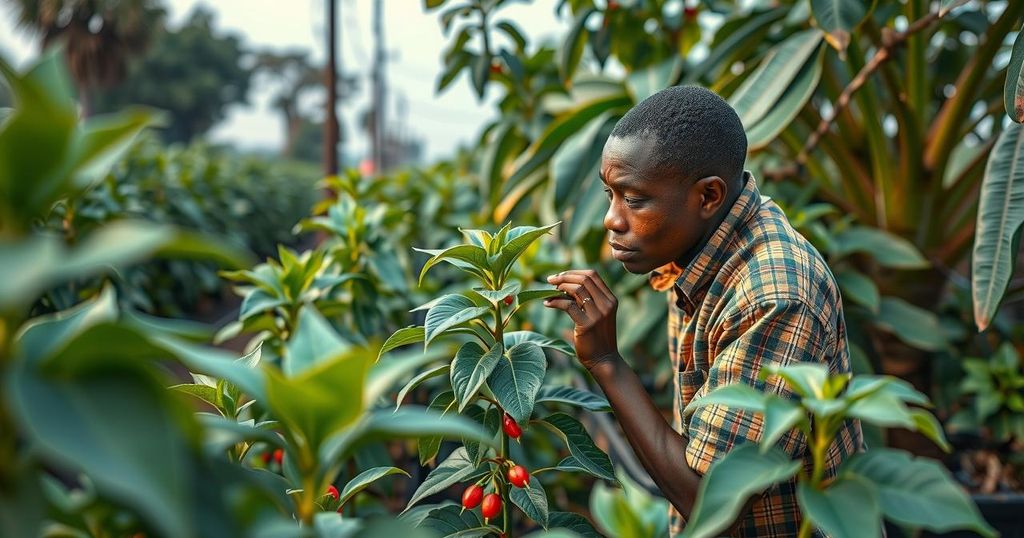A recent study published by CABI emphasizes the necessity of enhancing the plant health system in South Sudan to reduce crop losses from climate change-induced invasive pests. Particular pests such as the fall armyworm pose significant threats to agricultural productivity, coupled with a severe lack of access to plant health services among farmers. The findings underscore a pressing need for strategic interventions to strengthen agricultural resilience in this climate change hotspot.
A recent study conducted by the Centre for Agriculture and Bioscience International (CABI) has underscored the importance of enhancing the plant health system in South Sudan as a vital strategy for mitigating crop losses attributable to climate change-induced invasive pests. Published in the CABI Agriculture and Bioscience journal, the study highlights that the phenomenon of climate change has facilitated the introduction of numerous pests and diseases that adversely affect staple crops in the region, including elegant grasshoppers, bollworms, cassava whiteflies, and the particularly concerning fall armyworm (FAW). The rise of the FAW, which recently established itself in South Sudan, exemplifies the significant threat posed by invasive pests, as noted in a 2017 report from the Food and Agriculture Organization (FAO). South Sudan is categorized among the world’s climate change hotspots, characterized by an increasing frequency of extreme weather events that detrimentally impact plant health. Consequently, the livelihoods of approximately 86% of rural households, who rely on agriculture, are at risk, as emphasized by a 2023 report from the United Nations Environment Programme (UNEP). Despite the evident threats, a situational analysis involving 960 farmers across Juba, Yambio, and Yei revealed a notable deficiency in access to plant health services, including advisories and training. This gap has resulted in farmers depending heavily on non-governmental organizations (NGOs) and UN agencies for the necessary plant health support, illustrating a lack of effective government-led initiatives. The FAW poses a severe risk not only to maize, the predominant staple crop in South Sudan, but also to sorghum, millet, and various vegetables. Its presence has been detected in multiple regions, including Equatoria and parts of Jonglei. Other significant threats include plant diseases such as the cassava mosaic virus and blight affecting tomato crops. Although concrete data on yield losses due to climate change remains limited, it is notable that 87% of the population in South Sudan experiences moderate to severe food insecurity, largely due to climate-induced shocks, including pest infestations. Alarmingly, the papaya mealybug, a newly recognized pest, has been reported to cause up to 91% yield losses in papaya crops, severely impacting the livelihoods of smallholder farmers. Diseases like cassava brown streak disease (CBSD) and cassava mosaic disease (CMD) are further exacerbating the agricultural crisis, causing estimated losses in yields that could amount to hundreds of millions of dollars annually. The challenges facing South Sudan’s plant health system (PHS) include weak institutional and regulatory frameworks combined with a reliance on imported seeds and services due to the scarcity of quality planting materials. The PHS has transitioned from traditional knowledge and chemical-based practices to more advanced methods such as integrated pest management and diagnostic tools. The study advocates for a comprehensive approach to plant health delivery that entails strategic interventions to address existing challenges effectively. Opportunities exist to augment farmers’ knowledge on integrated pest management practices through enhanced advisory services, monitoring, and surveillance efforts. These measures ultimately hold potential for improving agricultural productivity and sustainability in South Sudan.
The article addresses the substantial impact of climate change on agricultural practices in South Sudan, specifically highlighting the increasing threat posed by invasive pests and diseases. As South Sudan struggles with food insecurity and reliance on agriculture for the majority of its rural population, the study emphasizes the pressing need for a strengthened plant health system to combat these emerging challenges. Factors contributing to agricultural vulnerability are analyzed, including the lack of access to effective plant health services and the role of various pests and diseases that threaten crop yields. By employing a systems-thinking approach, the study aims to provide strategic solutions to enhance plant health and, consequently, agricultural productivity in the region.
In conclusion, the study by CABI highlights the urgent need for a strengthened plant health system in South Sudan to mitigate crop losses resulting from climate change-induced invasive pests. With the alarming rise of threatening pests, such as the fall armyworm, and the prevalence of significant plant diseases, enhancing agricultural practices and access to plant health services is paramount. It is essential for government initiatives to fill the existing gaps in support for farmers, enabling the implementation of integrated pest management practices and ultimately improving the livelihoods of rural households dependent on agriculture in South Sudan.
Original Source: farmersreviewafrica.com






